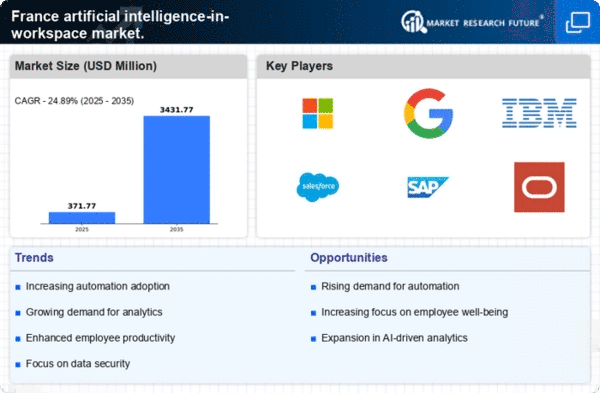Focus on Data-Driven Decision Making
In France, there is a growing emphasis on data-driven decision making, which significantly influences the artificial intelligence-in-workspace market. Organizations are increasingly leveraging AI analytics to derive insights from vast amounts of data, enabling informed strategic decisions. This trend is particularly relevant in sectors such as retail and healthcare, where data plays a crucial role in operational success. Reports suggest that companies utilizing AI for data analysis can improve decision-making speed by up to 50%. As businesses recognize the value of data-driven insights, the demand for AI solutions that facilitate this process is expected to rise, further propelling the artificial intelligence-in-workspace market.
Regulatory Support for AI Innovations
The French government is actively promoting the development and implementation of AI technologies, which serves as a significant driver for the artificial intelligence-in-workspace market. Initiatives aimed at fostering innovation and providing regulatory support create a conducive environment for AI adoption. The government has allocated substantial funding to AI research and development, with an investment of over €1 billion in recent years. This support not only encourages businesses to explore AI solutions but also enhances the overall ecosystem for AI technologies. As regulatory frameworks evolve to accommodate AI innovations, The artificial intelligence-in-workspace is likely to benefit from increased investment and adoption.
Rising Demand for Enhanced Productivity
The artificial intelligence-in-workspace in France experiences a notable surge in demand for solutions that enhance productivity. Organizations are increasingly seeking AI-driven tools to streamline operations, automate repetitive tasks, and improve overall efficiency. According to recent data, businesses that integrate AI technologies report productivity gains of up to 30%. This trend is particularly pronounced in sectors such as finance and manufacturing, where operational efficiency is paramount. The push for enhanced productivity is likely to drive investments in AI solutions, as companies aim to remain competitive in a rapidly evolving market. As a result, the artificial intelligence-in-workspace market is poised for significant growth, with organizations prioritizing AI adoption to achieve their productivity goals.
Integration of AI in Remote Work Solutions
The shift towards remote work has catalyzed the integration of AI technologies in workspace solutions across France. Companies are increasingly adopting AI tools to facilitate collaboration, communication, and project management among remote teams. The artificial intelligence-in-workspace is witnessing innovations such as AI-powered virtual assistants and intelligent scheduling tools that enhance remote work experiences. Recent statistics indicate that 70% of organizations in France are investing in AI solutions to support their remote workforce. This trend not only improves employee engagement but also optimizes resource allocation, making it a critical driver for the artificial intelligence-in-workspace market.
Growing Importance of Cybersecurity in AI Solutions
As the reliance on AI technologies increases, so does the need for robust cybersecurity measures within the artificial intelligence-in-workspace market. Organizations in France are becoming increasingly aware of the potential vulnerabilities associated with AI systems. Consequently, there is a rising demand for AI solutions that incorporate advanced security features to protect sensitive data and maintain operational integrity. Recent surveys indicate that 65% of businesses prioritize cybersecurity when selecting AI tools. This focus on security not only safeguards organizational assets but also builds trust among users, thereby driving the growth of the artificial intelligence-in-workspace market.
















